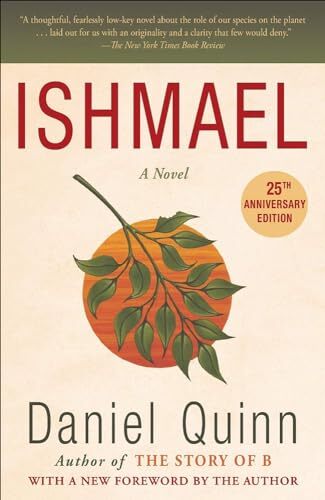
This is a well-written book that makes an effective use of a Socratic dialogue to drive its point home. It discusses big ideas, such as man’s role in the world, using wonderful analogies. As a result, it sucks you in and succeeds brilliantly at making you take a step back and think. For that alone, it is worth reading, and is worth a 4-star rating.
That said, the core arguments of the book are deeply flawed. Quinn tries to establish his argument by following a logical trail of thought, step by step, and even though I am far from an expert on philosophy or evolutionary biology, even I can see giant holes in many of those steps.
Here are just a few examples:
(spoiler alert)
-
We have somehow stopped our own evolution. That’s not how evolution works–it’s not a machine you just turn on and off!
-
Humans used to live in perfect harmony with nature. That’s demonstrably false. Countless species went extinct from natural causes (e.g., meteors) and from the actions of other species (e.g., overhunting, disease, etc). Even the hunter-gatherer societies Quinn seems to idolize wiped out entire species and left ecosystems in ruin.
-
Modern agriculture offers no benefits over a hunter-gatherer lifestyle. Really? The only advantage you can come up with is that it prevents starvation in case of a draught (which itself is nothing to scoff at)? How about not having to spend all your waking hours on food gathering and being able to do other activities, such as science, math, and, uh, writing books like “Ishmael?” How about access to a larger variety of foods and improved health? How about being able to support a population several orders of magnitude larger than you could ever have with a hunter/gatherer lifestyle? How about being able to travel to remote parts of the world or even outer space? How about being able to build homes that keep you dry, warm, and safe? How about being able to build cities that have running water, roads, and electricity?
-
The agricultural lifestyle must lead to the ultimate demise of all life on earth. Although the analogy with trying to invent flight was beautiful, this is a completely nonsense argument. Sure, if we don’t pay any attention to what we’re doing and pollute recklessly, one possible outcome is that we severely damage the planet. But there are also many other possible outcomes. There have been many solutions proposed, and some successfully tested, for sustainable agriculture, green energy, zero emissions cities, and so on. We have reversed the damage to the ozone layer, reduced the amount of lead in the atmosphere, and fixed many of our other screw-ups. Quinn paints it as an either-or scenario–either we go back to being hunter-gatherers or we all die–but there is absolutely no evidence of that whatsoever. If anything, some of the technologies we are developing–e.g. seed banks and space travel–makes life far more resilient than merely being subject to the whims of nature (just ask the dinosaurs).
-
We should be “at peace” with the world and not “at war” with it. This is absurd, as the world is at war with us. Or, to put it another way, the world doesn’t care about us one way or the other. We can live or die, and there is no divine being–no “gods” as he mentions in the story–who care whether we live or die. In fact, most things in this universe are constantly trying to kill us and wipe us out. The only way to survive is to fight, and every single species is in a fight for its survival every single day.
-
Hunter-gatherers lived in the garden of eden. This is patently absurd. They lived hard lives, constantly at risk of not getting enough food, of being eaten by a predator, of catching an awful disease. It was not a peaceful, relaxing existence like our modern day life, where one can sit in a quiet, safe home and write books like Ishmael. And even the meager lives that hunter-gatherers were able to scrape by were made possible not by the magical balance of nature, but by tools and techniques developed (one might even say evolved!) over generations. Spears, huts, clothing, and fire are not different in kind from agriculture, just in degree.
In short, the central thesis of the book is broken. But that doesn’t mean it’s not worth reading. The fact is that the book made me consider all these issues and think about them deeply. I think that’s the most important contribution of a book like this: it asks important questions, and even if we come up with different answers to them than Quinn suggests, the mere act of answering them makes us more conscious about how we should live our lives.
